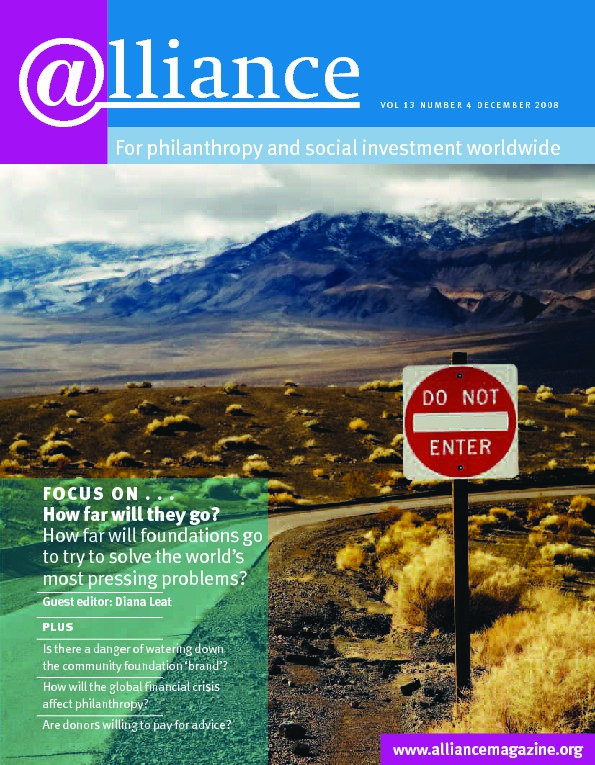 The precipitous fall in markets worldwide and fears of a global recession have created the most challenging economic situation in a generation. But as investors look closely at their portfolios, social investments can fill a niche that was previously unfilled.
The precipitous fall in markets worldwide and fears of a global recession have created the most challenging economic situation in a generation. But as investors look closely at their portfolios, social investments can fill a niche that was previously unfilled.
The financial crisis has altered the way investors perceive risk. When the equity markets were in a sustained bull market, investors began to expect increases in their portfolios every year. But now that the value of many investments has tumbled, investing suddenly seems more risky. Consequently, investors are looking equally at the investment’s risk, return, and social and environmental impact.
Social investments, which blend financial returns with higher social impacts, had a difficult time in recent years competing against traditional investments with higher returns but no social impact. Investors would generally be most concerned with the bottom-line return. But with investment values plummeting, investors can consider other facets of the investment in addition to its return.
‘Hitherto, there’s been a steely determination to focus only on the numbers, when what’s become apparent in the maelstrom we’ve been living in is that the numbers are unreliable,’ says James Bevan, chief investment officer for CCLA Investment Management, a UK-based fund manager for charities, churches and local authorities.
‘These are exciting times,’ he adds. ‘In a bull market, it’s easy to be greedy. But in a turbulent market like this one, people will begin to look at the totality of the investment’ – not only at the bottom line, in other words, but also at how the investment will affect the community and the broader issue of what the investment will do.
Turbulence in traditional financial vehicles comes at a time when social investment funds are increasing. The European Responsible Investor Forum (Eurosif) found that from 2005 to 2007, growth in European socially responsible funds more than doubled to total assets under management of €2.66 trillion.
In spite of the market turbulence this autumn, several social investment funds and companies successfully raised capital for their issues and closed their funds. BRAC, working with ShoreBank International of the US, closed its Africa Loan Fund having successfully raised $63.4 million to fund its operations in Uganda, Tanzania and southern Sudan. Adili, the UK ethical clothing company, successfully raised £1 million for its operations. Triodos Bank, based in the Netherlands, has received €20 million in commitments for its new €100 million microfinance fund.
Given the economic uncertainty, investors may not want to venture out of their traditional investments into social investments, but they will expect higher social and ethical standards from their original investments, says Guy Davies, head of charities at UK-based Pan Asset Management. ‘The social investment market isn’t going to multiply exponentially in the short term, but I think there’s a growing acceptance that social investment as a form is going to increase and be far more popular in the long term.’
While the tempestuous market conditions open up opportunities for social investments, it remains to be seen how the global economy will fare. The International Monetary Fund predicted in its World Economic Outlook report in October that the world economy is ‘entering a major downturn’ following ‘the most dangerous financial shock in the mature financial markets since the 1930s’.
For charities with their own investment portfolios to manage, the events of this autumn have done little to change either their strategies or their holdings, says Charles Mesquita, head of charity investment at Rensburg Sheppards. ‘Charities will have their strategies in place, and we’re not seeing them change those strategies. They’re not going to be moving things around as events unfold.’
At Charity Bank, the UK bank that uses its deposits to fund charities and social enterprises, demand continues to be high from charities needing funding, says Jerry Moore, senior manager of credit risk. He thinks the knock-on effect on the economy and social investments from the equity market conditions will be enormous.
‘We certainly live in interesting times, the most interesting in a lifetime,’ Moore adds. ‘This is by far the worst we’ve seen in a long, long time. But at the end of the day, there are still people out there who will invest, and we, as an institution, are very much open for business.’
Maureen Stapleton is an analyst at Investing for Good. Email mstapleton@investingforgood.co.uk
Investors’ perspectives is produced in collaboration with Investing for Good, a UK-based social finance intermediary and asset manager founded in 2004.
http://www.investingforgood.co.uk






Comments (0)